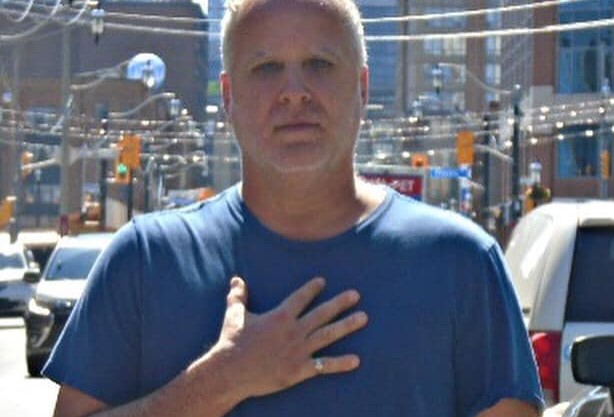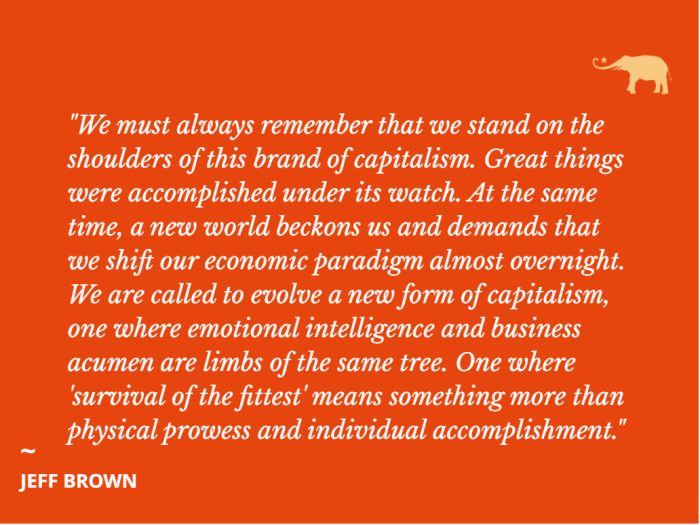Our world is changing quickly, and our approach to economic life must adapt to meet it.
This is no small thing—the future of our species and the well-being of our planet depend on it.
In the world that I grew up in, economic achievement was primarily an accumulative function. Our definition of success revolved around how much we could accumulate, without regard for our impact on the world around us.
We had carte blanche with respect to the commodification and exploitation of resources—both human and environmental—in the belief that unfettered capitalism would secure us and meet our needs. And it did, to an extent. Our standard of living generally improved and necessary structures were erected. Even as we seek to differentiate ourselves from it going forward, we must always remember that we stand on the shoulders of this brand of capitalism. Great things were accomplished under its watch.
At the same time, a new world beckons us and demands that we shift our economic paradigm almost overnight. We are called to evolve a new form of capitalism, one where emotional intelligence and business acumen are limbs of the same tree. One where “survival of the fittest” means something more than physical prowess and individual accomplishment, but also includes the survival of the planet and a true regard for the well-being of others. One where success is a measured by the sustainability of our innovations and their benevolent affects.
It is now entirely clear that our individualistic and accumulative focus came at a too high price. Not just environmentally, but also personally. Women have suffered terribly under unconscious capitalism, but so have men. We hear a lot about male privilege. What we don’t hear enough about are the many ways in which men suffered in the heart of their conditioning.
In a world where vigilance and vulnerability made impossible bedfellows, it was near impossible for many men to remain heart-centered while armoring their hearts to meet their responsibilities. As a result, men on average died younger, and often lived their lives emotionally isolated. With no ways to acknowledge and heal their wounds, their unresolved emotions often congealed and turned inward against the self in the form of mental and physical illness, or were mischanneled toward innocents.
Toxic masculinity and unconscious capitalism are, ultimately, a lose-lose proposition. Even the winners lose, because these emotionally armored ways of being destroy them and the planet we live on.
It is my view that the way to take us to the next level is to prioritize the co-creation of a conscious capitalism. Not a capitalism that pits us against each other, but one that includes us all and lifts us higher.
I think of this forward step in four primary ways:
First, benevolent intentionality
The conscious capitalist is determined to align his entrepreneurship with that which serves our greater good. Her choices extend beyond self-interest alone. Not every man for himself, but every man for humanity. And every man for the healing and preservation of the planet. Her notion of abundance is no longer limited to self-serving materialism, but weaves economic benefit with individual and planetary health. His shareholders are not merely those who own a percentage of the company, but includes everyone who will be impacted by his products and services. In charting her course, she is mindful of her impact on humanity. He understands that he does not operate in a vacuum, and governs himself accordingly.
The conscious capitalist has shifted his focus from a localized and ethnocentric perspective to a world-centric framework of perception. Rooted in the relational, her sense of responsibility extends well beyond her localized self and community. He does not compete for competition’s sake. She does not accumulate for the sake of accumulation. He is empowered but he does not exploit power. She derives her power from her connection to source, not from power over others.
Where possible, his choice-making is fueled by an expansive vision of possibility for all of humankind. One where we survive and thrive, as individuals, as a collective, as a planet…
Second, emotional intelligence and compassionate relating
Conscious capitalism is rooted in the inextricable relationship between individual and planetary healing. The more emotional healing we do, the more energy we have to heal our world. And the more emotionally present we are to recognize and to care about the detrimental consequences of our actions.
In the traditional model, we were often more effective if our hearts were armored. This kept us locked inside of ourselves with a linear focus. In this conscious model, we are more effective if our hearts are opened and healed. From this state of being, we actually feel our connection to the world around us. And when we feel it, we have a natural tendency to relate authentically and to compassionately interface with others and the planet. We can’t help but care, and that caring influences our every business choice and decision.
Third, equality and inclusivity
The conscious capitalist inherently understands that every individual is of equal value, with equal protections and benefits under the law. This philosophy relates to those he employs, those he serves, and those he co-creates with. He sees business as an opportunity to elevate and equalize the world we live in. And that quest for equality extends beyond human interactions. It also embraces the rights of the natural environment and all the species that inhabit it.
Man can no longer dominate the world we live in—he must approach it democratically, with equal regard for every thread in the tapestry. No longer master of this earthly domain, he is one among many, each mutually dependent on the other. The conscious capitalist is an inclusivist, determined to unite our world. With this in mind, he makes sure to invite every voice to the table. This includes multiple generations and a myriad of offerings and perspectives. All are given an equal opportunity to express their views. All are granted a chance to co-create. Where before, capitalism limited itself to particular skill sets, it is now open to the broadest range of offering. All creativities and artforms are welcome. This is the only way we can solve the climate crisis and ensure our well-being going forward.
We must take a more holistic approach to economic engagement and encourage others to actualize all of their aspects and skill sets so that we can respond to our challenges with greater imagination and innovativeness.
Fourth, a purpose-driven life.
At heart, the conscious capitalist is a purposeful and sacred activist. He recognizes that our species and our planet are in trouble, and he is determined to utilize his entrepreneurial gifts to unite and evolve us.
Where before, capitalism was directed toward self-serving ends—winning at any cost—the conscious capitalist recognizes that there can be no victories at the expense of the planet or the species that inhabit it. She is energized by her truest purpose, not by the machinations of the unhealthy ego. He has shed his limiting conditioning and self-identifications and is actively honing and clarifying his gifts and offerings. She has heard the call to a deeper life. This is the work of all of our lives. To fully understand the ways that our conditioning has shaped our ideas of who we are, and how we measure success, and to then define our path on our own unique terms. To make our contribution from all that we are.
I have great faith in humanity. I have great faith in our capacity to co-create an economic system that elevates and unites us.
There are places we need to go, and we are the pioneers we need to get us there. Pioneering a new way of being, one that benefits us all and preserves the planet that we call home. A conscious capitalism.


 Share on bsky
Share on bsky






Read 1 comment and reply